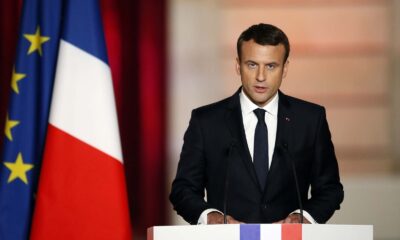Health
Pro-Brexit UK Sees Surge In Employment For Nigeria’s And Indians, Outpacing EU Nationals

New data from His Majesty’s Revenue and Customs (HMRC) reveals that Nigerians and Indians have experienced the most significant growth in employment in the UK between 2019 and 2023, outpacing all other non-European Union (EU) nationalities. This surge has been attributed to the UK’s post-Brexit migration system, introduced in January 2021, which has dramatically reshaped the job market. According to a Freedom of Information (FOI) request made by Neil O’Brien, a member of parliament and former government minister, employment for EU nationals in the UK saw a decline of about 10% during this period, while employment for non-EU nationals increased by 69%. This shift was noted before the general election last month, with O’Brien describing the changes as “extraordinary.” The data shows that of the 1.481 million new jobs created in the UK between 2019 and 2023, an overwhelming 1.465 million were filled by people from outside the EU. UK nationals accounted for only 257,000 of these new positions. Within this non-EU total, the most significant growth in employment was recorded among nationals of India (+488,000), Nigeria (+279,000), Pakistan (+101,000), and Ghana (+55,000). Additionally, there were 175,600 more jobs held by people from unspecified non-EU countries. O’Brien highlighted the striking nature of these figures, noting that more jobs were created for nationals of India and Nigeria alone than for UK citizens during this period. In the UK private sector, non-EU nationals saw an increase of 1.2 million in employment, while UK nationals secured only 29,000 new jobs. Despite this employment boom, the earnings of migrants from India and Nigeria have seen a steep decline relative to their UK counterparts. Before the pandemic, young working-age people from these countries earned 15% and 10% more than UK nationals of the same age, respectively. However, they now earn less than their UK counterparts, marking a significant shift in their economic standing. Ben Brindle, an economist at Oxford University’s Migration Observatory, suggested that non-EU migrants are increasingly taking over jobs that were previously held by EU workers before Brexit and the COVID-19 pandemic. This trend underscores the complex and evolving dynamics of the UK labor market in the post-Brexit era, where the implications of migration policies continue to unfold.
Health
WHO Raises Alarm as Global Cholera Deaths Surge by 50%

WHO Raises Alarm as Global Cholera Deaths Surge by 50%
The World Health Organization (WHO) has raised fresh concerns over the global cholera crisis, revealing that deaths from the disease rose sharply for the second year running, despite the availability of effective prevention and treatment options.
In its latest report released on September 12, 2025, the UN health agency disclosed that cholera cases grew by 5 percent in 2024 compared to the previous year, while fatalities spiked by a staggering 50 percent.
Officially, more than 6,000 deaths were recorded, although WHO warned that the actual toll could be far higher due to widespread underreporting.
The report underscores how a disease once regarded as both preventable and easily treatable is staging a deadly resurgence.
Sixty countries reported cases in 2024, up from 45 in 2023 — one of the widest global spreads seen in recent years.
Alarmingly, 98 percent of infections were concentrated in Africa, the Middle East, and Asia, where fragile health systems, conflicts, and poor access to clean water have left millions vulnerable.
“This disease should not be killing people in the 21st century. We have the tools to prevent and treat cholera effectively,” WHO officials said, linking the resurgence to deeper challenges in sanitation, safe drinking water, and access to equitable healthcare.
The surge in cholera cases comes at a time when many countries are already grappling with overstretched health systems weighed down by other infectious diseases, humanitarian crises, and climate-related disasters.
Experts point to flooding, drought, and mass displacement as key factors creating fertile ground for fresh outbreaks.
WHO and public health experts are now urging urgent global investment in water, sanitation, and hygiene infrastructure, alongside broader vaccine coverage and stronger rapid response systems.
Without these interventions, the organisation warns, the deadly upward trend could persist through 2025 and beyond.
For millions of families, cholera is no longer a relic of the past. It has re-emerged as a present and escalating threat to global health security.
Health
African Health Ministers Adopt Landmark Framework to Tackle Oral Diseases

African Health Ministers Adopt Landmark Framework to Tackle Oral Diseases
African ministers of health have adopted a new regional framework aimed at accelerating action against oral health diseases, which affect about 42 per cent of the continent’s population.
The framework was endorsed on Tuesday at the 75th session of the World Health Organization (WHO) Regional Committee for Africa in Lusaka, Zambia.
It sets ambitious targets, including ensuring that at least half of each country’s population has access to essential oral health services, a 10 per cent reduction in the prevalence of major oral diseases, and that by 2028, 60 per cent of African countries have national oral health policies backed by budgets and trained staff.
Also central to the plan is the integration of noma—a neglected but devastating disease—into national health strategies in at least 50 per cent of endemic countries.
“Oral diseases have been largely neglected, making them among the most prevalent in our region,” said Dr Mohamed Yakub Janabi, WHO Regional Director for Africa.
“Our efforts to address this threat need to be robust, concerted and sustained. The framework agreed today highlights the urgent need for countries to prioritize oral health, ensuring adequate financing, workforce and leadership through a more integrated people-centred approach.”
WHO says oral health must be treated as a key part of universal health coverage.
To that end, it has supported governments with technical expertise, training, and advocacy.
Recent milestones include the abolition of toothpaste tax in Mauritius to expand access to fluoride toothpaste, enrolment of more than 14,000 health workers in WHO oral health training, and progress in securing recognition of noma as a neglected tropical disease in 14 countries.
Senegal’s Health Minister, Ibrahima Sy, welcomed the framework, stressing his country’s commitment to tackling noma and other oral health challenges.
“Senegal has long recognized noma as a critical public health issue. We are committed to ensuring that we are at the forefront of protecting people against oral diseases through a multisectoral approach,” he said.
Despite the scale of the challenge, investment in oral health across the region remains low. In 2019, more than 70 per cent of African countries spent less than US$1 per capita on oral health, far below the global average of US$50.
Only four countries had national fluoride guidelines as of 2023, and the region continues to face a severe shortage of oral health professionals—just 3.7 per 100,000 people, compared to the 13.3 required to meet current service demand.
To close these gaps, the framework outlines five priority actions: strengthening leadership and financing, developing national oral health policies, integrating oral health into essential service packages, bridging workforce deficits through task-sharing, and improving access to medicines and disease surveillance.
Health ministers pledged to mobilize political will, domestic and external resources, and technical expertise to ensure the framework delivers tangible results for millions of Africans at risk of preventable oral diseases.
Health
Experts Warn Untreated Vaginal Infections Can Lead to Infertility, Ectopic Pregnancy

Experts Warn Untreated Vaginal Infections Can Lead to Infertility, Ectopic Pregnancy
Reproductive health experts have cautioned women against neglecting vaginal infections, warning that untreated cases could result in long-term complications, including infertility, ectopic pregnancy, chronic pelvic pain and miscarriage.
The gynaecologists, in separate interviews with PUNCH Healthwise, explained that while many women dismiss early symptoms such as unusual discharge, itching and foul odour, untreated infections often spread from the vagina to the cervix, uterus and fallopian tubes, causing irreversible damage to reproductive organs.
A Professor of Obstetrics and Gynaecology at the University of Ibadan and second Vice President of the Society of Gynaecology and Obstetrics of Nigeria (SOGON), Prof. Chris Aimakhu, noted that infections could be caused by bacteria, fungi or viruses, with some posing greater threats than others.
He said poor hygiene, sexually transmitted infections and bacterial organisms were common sources of contamination, stressing that women were particularly vulnerable to fungal infections such as candidiasis.
“The vagina is an open place that is not protected, and women can have contamination from the outside. The most common fungal infections like Candida thrive easily in moist environments. We also see viral infections such as HIV, human papillomavirus, herpes simplex and hepatitis, though bacterial infections remain the most frequent,” Aimakhu said.
According to him, untreated vaginal infections could escalate into pelvic inflammatory disease (PID), an ascending infection that damages the uterus and fallopian tubes. He warned that PID can lead to ectopic pregnancy, infertility, abscess formation inside the pelvis and chronic pelvic pain.
“Blocked or damaged fallopian tubes are one of the most common ways infections lead to infertility. When the infection ascends, it can block the tubes, preventing sperm and eggs from meeting. This is why childbirth should be conducted in a hygienic environment,” he added.
Also speaking, a Consultant Gynaecologist and Medical Director of The Strong Tower Specialist Hospital and Fertility Centre, Dr. Ayodele Ademola, identified bacterial sexually transmitted infections such as chlamydia and gonorrhoea as the most dangerous for fertility.
“The commonest infections that can affect fertility are chlamydia and gonorrhoea. These are silent and often not detected in routine laboratory tests, but when advanced, they block the fallopian tubes or damage reproductive structures. Fungal infections like yeast infections are common but largely cause discomfort rather than infertility or cancer,” he said.
Ademola further explained that untreated infections could also affect men, leading to conditions such as obstructive azoospermia, where sperm cells are absent in semen due to blocked reproductive passages.
“Untreated reproductive tract infections can cause strictures or damage to passages, making conception impossible. Some infections even affect implantation, such as tuberculosis of the endometrium. This is why treatment should always be handled by specialists,” he warned.
Both experts urged women to seek prompt medical attention rather than rely on self-medication or unverified remedies, noting that early detection and treatment remain key to preventing permanent reproductive health challenges.
-

 Analysis7 days ago
Analysis7 days agoThe Agony of a Columnist, by Alabidun Shuaib AbdulRahman
-

 Analysis5 days ago
Analysis5 days agoNow That Nigeria Has a U.S. Ambassador-Designate, by Boniface Ihiasota
-

 Diplomacy5 days ago
Diplomacy5 days agoCARICOM Raises Alarm Over Political Crisis in Haiti
-

 News6 days ago
News6 days agoMacron invites Chad’s Déby to Paris amid push to reset ties
-

 News6 days ago
News6 days agoTinubu Unhurt After Brief Stumble at Turkey Reception
-

 News6 days ago
News6 days agoCourt, Congress Pile Pressure on DHS Over Minnesota Operations












